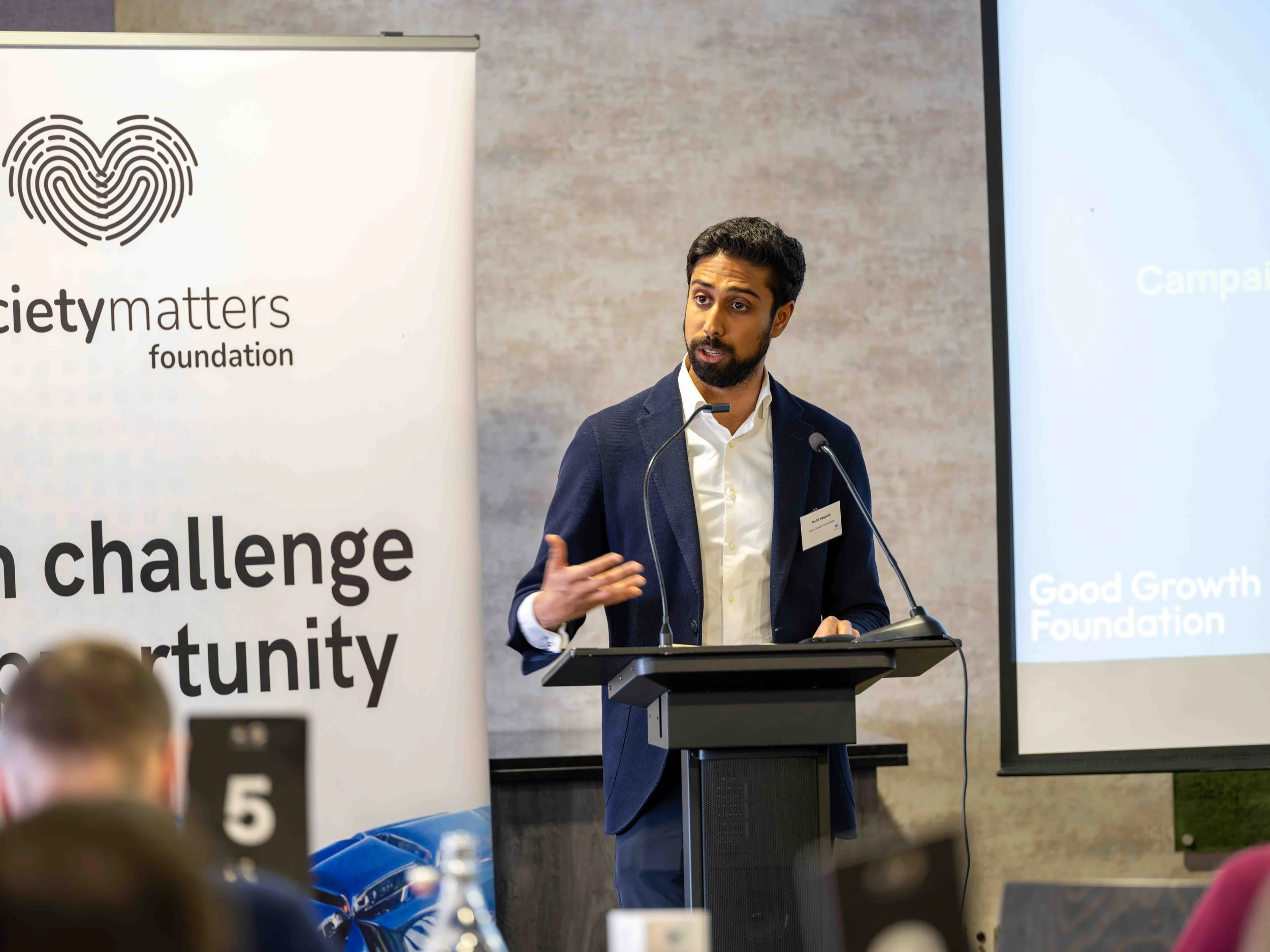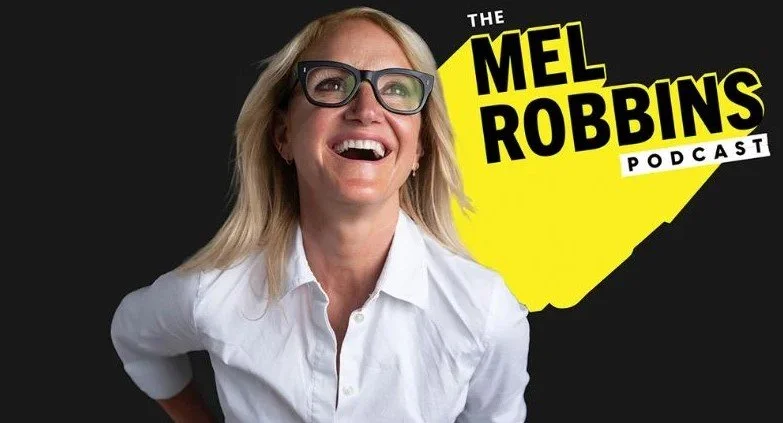Welcome to the fifth edition of the This is the North podcast newsletter.
What Does 'Good Growth' Really Mean? Rethinking Prosperity in the North
by Alison Dunn, with insights from Praful Nargund.
Recently, I sat down with Praful Nargund, founder of The Good Growth Foundation, in a conversation for the ‘This is The North Podcast’ that struck at the heart of what's really happening in communities across the North. What emerged wasn't just illuminating – it was a revelation about how profoundly disconnected economic policy has become from people's lived experiences.
Image left: Praful speaking at our Society Matters Foundation launch event on Monday 24th March 2025. Photograph taken by Richard Eyers.
The Prosperity Paradox
"There was a real sense in our work that when the economy grew, it used to benefit us...20, 30 years ago. It just used to benefit us, and we had that sense, and that's been broken. It doesn't benefit us anymore."
This observation from Praful stopped me in my tracks. How powerfully it captures what I've witnessed in communities throughout the North – the growing disbelief when politicians trumpet economic success while families struggle to heat their homes.
Praful's journey to founding the Good Growth Foundation is itself a testament to how personal experience shapes our understanding of economic systems. Born in Bradford to Indian parents who came to work in the NHS, he witnessed firsthand how life chances could be transformed through opportunity. Later, building a business that tackled inequalities in IVF treatment – making it more affordable and improving the experience for women – he saw how business could be harnessed as a force for good.
"Is There a Bad Growth Foundation?"
When I asked Praful about the name of his organisation, he laughed: "The first question people ask is 'Is there a bad growth foundation?'"
The answer, it turns out, is yes – at least in the public's mind. Growth that doesn't translate to improvements in everyday life isn't just meaningless; it's actively harmful to public trust.
The Good Growth Foundation's research reveals just how dramatically public attitudes have shifted.
When they asked people about economic priorities:
Bills trumped wages every time.
People were deeply sceptical that wage increases would outpace rising costs. As I put it to Praful, "If I'm worrying about paying my bills, the last thing I'm thinking about is where I'm going to be in five years."
Local SMEs were seen as the real engines of change – not politicians, not global corporations.
As Praful explained: "If you want to transform a community, it'll be the businesses that are invested in that community that will employ local people, create opportunity, and spur other businesses to grow."
A New Direction
GDP figures fell flat.
Abstract economic metrics simply don't resonate when they don't translate to tangible improvements in day-to-day life.
What stays with me after this conversation is both the scale of the challenge and the clarity of the path forward. We need economic policies that people can see, feel and touch – that make a tangible difference to the cost of living, create real opportunities, and strengthen local communities. This is something we’ll continue to advocate for via the Society Matters Foundation, Society Matters Group and Citizens Advice. As Praful explained, it's about laying "breadcrumbs" toward better outcomes – small, visible steps that show people how they fit into the bigger picture of economic transformation. It's about replacing abstract GDP targets with measures that reflect what matters in people's everyday lives.
In a world of increasing instability, with bills rising and opportunities shrinking, Praful's vision of inclusive growth feels both urgent and possible. Growth that creates prosperity not just in economic terms but in the quality of people's lives. Growth that makes everybody feel like they are coming on this journey with us.
Because ultimately, as this conversation made clear, change only happens when we connect big ideas with real people's lives.
Until next time,
Alison Dunn
Listen to the full This is the North podcast:
> Spotify
> Apple Podcasts
If you enjoyed this newsletter, please like, share and subscribe. It takes less than 10 seconds and makes you part of something essential: a community of people who believe transformative conversations can become catalysts for positive change.
I'd love to hear your thoughts on what "good growth" would mean for your community – what would make economic progress feel real in your daily life?
This is The North Podcast is your source of transformative conversations. An intentional challenge to the systems holding back the North of England. Hosted by Alison Dunn, an award-winning charity chief executive and former solicitor. This podcast is supported by Society Matters Community Interest Company and is dedicated to curating and sharing knowledge, powering the change we need for a more equal and inclusive society. Subscribe to never miss an episode and join our mission to build a stronger, more equitable society for all. This podcast is produced by Purpose Made, empowering change through intentional leadership and shared knowledge.
I've seen this reality in communities across the North East. We have 170,000 children living in cold homes in our region – a stark reminder of how abstract economic growth has failed to translate into basic warmth and security for our most vulnerable.
The Trust Gap
Beyond the North-South Divide
Bridging the Gap: Skills and Bills
What struck me most powerfully about Praful's research was how it transcended regional divisions. While there were differences – the Northeast showed more interest in housing and clean power, the Northwest was more supportive of devolution – the fundamental experience of economic inequality connects communities across the country.
This creates a particular challenge for those of us advocating for the North. How do we fight for regional equality without pitting communities against each other?
As Praful described, this divisiveness "doesn't necessarily mean that you'll actually get the outcomes you want." We need to find ways to work together, recognising that inequality exists everywhere – whether in Bradford, Newcastle, or London's poorest boroughs.
I couldn't help noticing the parallels between Praful's findings and what I've observed in my work: "There's a complete disconnect between what the public believe and what's actually happening."
But Praful offered an important nuance: "I would just caution that it's not totally about trust – a lot of it is about lived experience."
The public's scepticism isn't irrational. When returns on capital remain healthy while real incomes stagnate, people aren't wrong to identify that someone else is benefiting. When years of austerity hollow out local authorities, it's reasonable to question whether devolution alone will improve economic circumstances.
When I asked Praful what political parties should be doing differently, his answer was refreshingly direct: "Skills and bills."
Focus on what people can see and feel in their daily lives – reducing the cost of essentials and creating accessible skills pathways that people can actually access.
This approach requires both reframing how we talk about economic policy and reshaping the policies themselves. The example of retrofitting homes in the North East perfectly illustrates this challenge. While we understand the long-term imperative for climate action, the immediate priority must be addressing fuel poverty – wrapping those homes where 170,000 children currently shiver.
As Praful pointed out, this isn't an either/or proposition. Climate-friendly retrofitting could simultaneously achieve net zero targets, reduce poverty, improve health outcomes, enhance educational opportunities, and decrease pressure on public services. That's the kind of holistic growth story that resonates with people's actual lives.
Publications
You can read the Good Growth Foundation’s ‘Mind the Gap’ report here, and I would also recommend reading their recently published, Third Rail of British Politics publication around how to repair the UK-EU relationship without getting burned.

A deep dive into the archive…
A great accompaniment to Praful’s conversation about economic growth and the creation of an inclusive economy is an earlier conversation I had with Dr Nicola Headlam, a renowned independent economic adviser and former Head of the Northern Powerhouse in which we delve into the intricacies of policy and politics from the era of Thatcherism and Lord Heseltine to today's complex geopolitical landscape.
This week I’m reading…
Shuggie Bain by Booker 2020 prize winner Douglas Stuart. It’s a gritty novel set in Glasgow just after the miners strike. It follows the life of a young boy struggling to find his place in the world and within the context of poverty, addiction, and societal struggles during Thatcher’s reign. I can’t lie, this is a hard book to read, it took me far longer than it should have done but it is deeply compelling and worth the effort.
This week I’m listening to…
Mel Robbins, The Body Reset: How Women Should East & Exercise for Health, Fat Loss, & Energy. Once I got past the very American-esque start to this podcast, I really enjoyed the conversation with Dr Stacy Simms, a world-renowned exercise physiologist and nutrition scientist. Dr Simms reveals why traditional fitness advice is failing women. Now the men in my life at this point will be saying “here she goes again, stuck record”, but it is a truth that the world is often not designed for women. (If you haven’t read Invisible Women by Caroline de Perez you really should!). Many of the fitness trends popping up on our social media accounts are designed by men for men, and when they are informed by women its often a very small sample or shall we say for the younger demographic! American excitability aside, this felt like a really intelligent conversation, not a mind-blowing OMG, but several light-bulb moments.
This week I’ve been…
It was a huge privilege and a bit of a surprise to find myself in the Business Cloud Northern Leaders List 2024 and a real treat to get an invitation to an exclusive Northern Leaders event this week to hear Dragon’s Den star Sarah Davies MBE, local entrepreneur, founder and leader of Moja, Sophie Milliken MBE, and Roisin Currie, CEO of Greggs, a much loved North East business. The event was hosted by KPMG in their scenic Newcastle Office, sponsored by Lycetts and hosted by the very charming and funny Chris Maguire of Business Cloud. A real treat, and a great opportunity to catch up with colleagues new and old from across our region.






